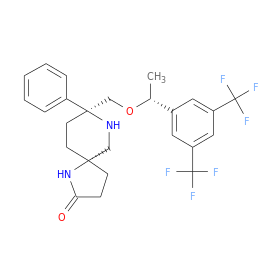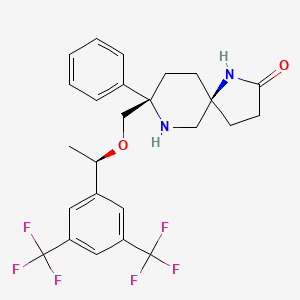
Tesaro, Inc. an oncology-focused biopharmaceutical company, today announced that the U.S. Food and Drug Administration (FDA) has approved Varubi (rolapitant) IV in combination with other antiemetic agents in adults for the prevention of delayed nausea and vomiting associated with initial and repeat courses of emetogenic cancer chemotherapy, including, but not limited to, highly emetogenic chemotherapy. Delayed nausea and vomiting can occur anytime between 25 and 120 hours following chemotherapy, and is often extremely debilitating.
About Varubi
Varubi is a highly selective and competitive antagonist of human substance P/neurokinin 1 (NK-1) receptors, which play an important role in the delayed phase of chemotherapy-induced nausea and vomiting (CINV). With a long plasma half-life of approximately seven days, a single dose of Varubi, as part of an antiemetic regimen, significantly improved complete response (CR) rates in the delayed phase of CINV. Results from three Phase 3 trials of Varubi oral tablets demonstrated a significant reduction in episodes of vomiting or use of rescue medication during the 25- to 120-hour period following administration of highly emetogenic and moderately emetogenic chemotherapy regimens. In addition, patients who received Varubi reported experiencing less nausea that interfered with normal daily life and fewer episodes of vomiting or retching over multiple cycles of chemotherapy. Results from a bioequivalence trial demonstrated comparability of the IV and oral formulations of Varubi.
Varubi IV is supplied in ready-to-use vials and does not require refrigerated storage or mixing. As a result, utilization in busy chemotherapy clinics is straightforward and easily adopted into existing practice patterns for administration of antiemetic regimens associated with emetogenic chemotherapy. Varubi IV is to be administered up to two hours before chemotherapy administration in combination with a 5-HT3 receptor antagonist and dexamethasone. No dosage adjustment is required for dexamethasone, a CYP3A4 substrate, and Varubi is the first intravenously administered NK-1 receptor antagonist approved by the FDA that does not contain polysorbate 80.
“The approval of Varubi IV represents a significant milestone for TESARO. The majority of NK-1 receptor antagonist doses are administered intravenously in the U.S., and with the introduction of Varubi IV, we now offer healthcare providers a unique, easy-to-use option that fits well into standard operating practices of a chemotherapy clinic or hospital,” said Mary Lynne Hedley, Ph.D., President and COO of TESARO. “We will continue our efforts to expand awareness of delayed chemotherapy-induced nausea and vomiting, and plan to make this important medicine available next month.”
“Many healthcare providers tend to believe that CINV is no longer an unmet need but the reality is that more than half of patients treated with emetogenic chemotherapy experience delayed CINV, even when prescribed standard preventative therapies, such as a 5-HT3 receptor antagonist and dexamethasone,” said Lee Schwartzberg, M.D., Professor of Medicine at University of Tennessee Health Science Center. “The FDA approval of VARUBI IV gives doctors and nurses a new option to help protect their patients from these often preventable side effects.”



